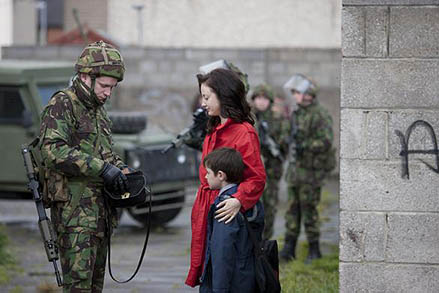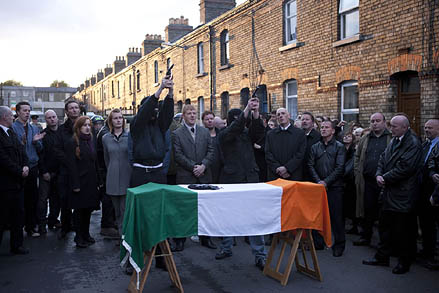|
The action of the film takes place mainly in Belfast in the 1990s, shortly before the Good Friday Agreement that brought to an end (at least in theory) the most recent round of Ďtroublesí in this much-troubled little province.
Having lived in Belfast through the earlier phase of this campaign, as well as researching it again more recently for a book, what immediately struck me was how well the filmmakers had captured the atmosphere and mindset of a Provisional IRA family living in a housing estate on the outskirts of the city during the dying spasms of that bitter and ugly campaign. The scriptwriter, Tom Bradby, was ITNís principal Belfast reporter during this period, and sees right to the core of all his characters.
The intelligent and always comprehensible script deals with the hierarchy of deception and misinformation by which both MI5 and the Provisionals control the unwitting pawns who are their own foot soldiers. By cynical manipulation of the truth and the selective holding back of information, the puppet masters of both sides seek to steer the actions of their junior agents and obtain the outcomes they desire. I have never seen a more convincing account of how a terrorist war is waged and resisted.
A female terrorist, brilliantly acted by Andrea Riseborough, is captured by MI5 agents and offered a deal: either a long prison sentence with little chance of contact with her young son, or release on condition that she becomes a British agent and spies on her comrades, many of them her own family members. She takes the deal, and must tread a terrifying line between the demands of the junior MI5 field officer (Clive Owen) who is her allotted controller and the fanatical local IRA commander and Ďhard linerí (David Wilmot), who will countenance any degree of brutality in his desperation to prevent the split thatís developing within his own organisation over new compromises that Whitehall is offering. This is an endgame, all the players are war-weary and steeped in moral compromise, life has become cheap and scruples long abandoned. The tension builds to a painful crescendo, and the filmís conclusion comes as a genuine shock.
But more important than the suspense and the violence, which has been done before, Shadow Dancer renders the motivation of its characters and the political context in which they operate comprehensible, and thatís something that I donít think any of the British or American films dealing with this campaign have achieved. This is as good as political thrillers get.
SEND ME AN EMAIL 
|













